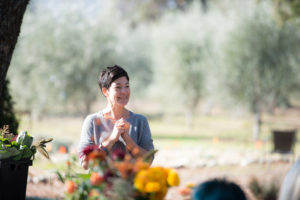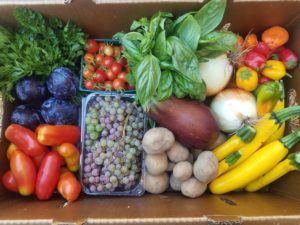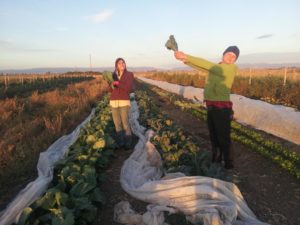Sep 5, 2018
By Stephanie Oelsligle Jordan, Local Food Project Manager
I once came across a birthday or anniversary card that said something like this: “I love it when you whisper those 3 little words in my ear…..Let’s Eat Out!” It’s true. Making dinner has become something we all love and hate at the same time, and the complexity surrounding it is likely multiplied by how many jobs/children/after-school activities/deadlines you have. Even as a trained chef, I find myself at times guiltily turning to easy, processed food from a box (i.e. mac & cheese!) for my two boys on any given weeknight.
More truths: the demand for prepared food has become stronger, and the quality of some prepared foods has become very questionable. Wouldn’t it be nice if someone were around to cook you healthy dinners, made from ingredients that came from local, organic farmers in Solano County? Well, that is exactly what has been happening for the past 4 weeks. In mid-August, I began working on a pilot program with Cultivate Community Food Co-op – funded by Solano Department of Public Health – which I’ve been calling “Community Supported Dinners.” These dinners are much like what we envisioned within our original Community Food Center model – homemade meals made by local chefs from local ingredients.
The main purpose of this 6-week pilot is to test costs, logistics and other factors involved, which will provide us with information to fine tune the vision. Greg Morrison (Board Treasurer of the Co-op, and on our USDA Local Food Advisory Board) has organized a distribution plan to get raw food products from the farms to me in the commercial kitchen at Vallejo’s Dan Foley Cultural Center. Deliveries come Monday and Tuesday mornings, and by Tuesday afternoon, my assistant Veronica Bearce and I have meat or vegetarian dinners cooked, cooled, boxed, labeled and ready to get delivered to folks in Benicia and Vallejo. Speaking of Veronica, she is also the chef-owner of Veronica’s Veggies, which specializes in vegan food.
The participants for this project are largely Co-op members (sorry – it’s not open to the public yet!), who also have the option to purchase raw ingredients directly from the farms through an online ordering system. Feedback from the farmers has been positive, because they can get direct-to-consumer sales without having to stand at a farmers market or utilize other resources to get their products to people. Fresh produce for the project comes from Eatwell Farm (Dixon) and Lockewood Acres (Vacaville). Meat products are sourced from Tara Firma Farms (Petaluma), and fish is sourced from Real Good Fish, which supports sustainable fishermen/women up and down the California coast. While I have been ordering products based on consumer counts, I am more interested in knowing whether people would sign up in advance for dinners (similar to how a CSA operates). Would you pre-pay for, say, two months of dinners every Tuesday? I promise I won’t make mac & cheese.
Menus thus far:
Aug. 14: Caribbean Chicken / Black Beans with Sofrito + Coconut Quinoa with Cilantro + Roasted Seasonal Veggies
Aug. 21: Indian Spiced Lamb Meatballs / Indian Spiced Eggplant + Tzatziki Sauce + Chickpea-Tomato Salad with Feta Cheese + Whole Wheat Pita
Aug. 28: Spanish Paella with Chicken & Pork Linguica / Paella with Roasted Peppers & Onions + Lemon-Garlic Aioli + Fig Salad with Mixed Greens, Walnuts, Goat Cheese
Sept. 5: Mustard-Glazed Salmon atop Cannellini Bean & Tomato Ragu + House-made Focaccia + Classic Greek Salad
Special Thanks to Eatwell Farm, Lockewood Acres, Tara Firma Farm, and Real Good Fish for assisting with this project!
Sep 3, 2018
By: Marcella Licea

[Photo: Alexis, Owner of Soul Food Farm, Source: thepollenmill.com]
Through years of hard work and developing a deeper connection with the land, Alexis and Eric began to further immerse themselves in issues around community land use, the true cost of feeding people, workers’ rights and the humane treatment of animals. Today, Soul Food Farm is working on a number of new expansion projects that will add layers of diversity and variety for community members, such as heirloom peaches, apricots and pears. In addition to more fruit trees, they also plan on extending the olive orchard and are in the planning stages of a farm store, tentatively scheduled to open in the spring of 2019. This farm store will not only sell Soul Food Farm goods, but produce and other products from local farms in the region.
Every year, Soul Food Farm hosts a wide variety of workshops on the farm. Everything from artisan cooking classes, photography, herb gardening, basic chicken care, and so much more; our calendar of events has something for every pallet. This month on Saturday, September 22nd from 1:00pm-4:00pm, engage in a panel discussion between six of the most successful and driven women entrepreneurs of the Bay Area at Soul Food Farm’s first annual Women of Abundance Conference: Women Entrepreneurs in the Regenerative Culture, Economy, and Community. The conference stemmed from Alexis’ interest to explore the dynamics between food and agriculture and its intersection with social justice movements– both integral parts woven into the fabric of Northern California. This event will examine the ideas of competition, explore the realms of abundance and manifestation, and cultivate the possibilities of growing together in success through collaboration and support. Click here to register and ticket information.
Sep 3, 2018
By Elena Karoulina, Executive Director
We continue working on our big vision for the environmentally and economically sustainable and socially just local food system in our county. As a part of our Community Food Center project, funded by USDA, we are finalizing the feasibility study of the agriculture production available for the needs of the county. In June-July, our mighty working team of Sustainable Solano staff, UC Davis interns and a representative of the Solano Public Health, our key partner in this vision, embarked on reaching out to our farmers and meeting face to face with them to better understand the reality of farming and feeding the community in Solano County.
We reached out to 60 farms. Most of them are small to mid-size operations, producing a variety of food (mostly produce, but also honey, olive oil, eggs, meat and dairy). Not everyone was available or interested to talk with us about the emerging local food system, and we totally understand and respect this reservation. However, many opened their hearts and minds to this vision, and we are immensely grateful to the farmers who took time off their busiest season of the year to sit down with us and to tell us the true story of local food production and distribution.
We are still finalizing the results of our interviews and integrating them with relevant statistics from USDA and Solano Department of Agriculture to form an accurate picture of the state of agriculture production suitable for the local markets. What we see so far is a rather weak supply, a lack of infrastructure and most importantly, a week demand for Solano-grown food. If we are to change this picture, if we are to create a resilient local food economy, we’ll have to revisit our relationship with local food, our commitment to buying locally and our priorities as consumers.
 Sustainable Solano is committed to continue working with various stakeholders and community partners to strengthen our local food economy. However, we cannot do it without a broad support of this vision from our communities! Please give your personal and family food supply a thought! To find out more, attend one of our many public educational events and consider buying truly local. For the list of Community Supported Agriculture, farm stands, restaurants and retailers, please click here.
Sustainable Solano is committed to continue working with various stakeholders and community partners to strengthen our local food economy. However, we cannot do it without a broad support of this vision from our communities! Please give your personal and family food supply a thought! To find out more, attend one of our many public educational events and consider buying truly local. For the list of Community Supported Agriculture, farm stands, restaurants and retailers, please click here.
From the bottom of our hearts, THANK YOU to the owners and operators of the following farms who communicated with us during this process and contributed to our understanding of the current state of our local food economy:
Acquistapace Farms, Fairfield
Be Love Farm, Vacaville
Brazelton Ranch, Vacaville
Cherry Glen Beefmasters, Vacaville
Eatwell Farm and CSA, Dixon
Everything Under The Sun, Dixon
Grabishfarm, Dixon
Il Fiorello Olive Oil Company, Fairfield
Lockewood Acres Organic Farm, Vacaville
McCormack Ranch
Menagerie Hill Ranch, Vacaville
Pleasants Valley Honey Company, Vacaville
Robledo Produce, Fairfield
Rock Hill Ranch Chickens, Fairfield
Saechao Family Farm, Fairfield
Sepay Groves Olive Oil, Fairfield
Sierra Orchards, Dixon
Solano Mushroom Farm, Vacaville
Soul Food Farm, Vacaville
Tenbrink Farm, Fairfield
The Cloverleaf at Bridgeway Farms, Dixon
The Collins Farm, Dixon
Jul 31, 2018
By Stephanie Oelsligle Jordan
 Over the past month, I (and others on the Local Food team) have been visiting farmers, ranchers and food producers in Solano County to get a more concrete picture of the current local food supply. Clay Ford of Pleasants Valley Honey Company was on my list. “Do you want to visit the apiary?” asked Clay, as I was arranging a meeting with him. “Sure,” I replied, “that would be great!” On a hot June Friday, I drove out to Soul Food Farm, which is one of five locations where Clay keeps his bees.
Over the past month, I (and others on the Local Food team) have been visiting farmers, ranchers and food producers in Solano County to get a more concrete picture of the current local food supply. Clay Ford of Pleasants Valley Honey Company was on my list. “Do you want to visit the apiary?” asked Clay, as I was arranging a meeting with him. “Sure,” I replied, “that would be great!” On a hot June Friday, I drove out to Soul Food Farm, which is one of five locations where Clay keeps his bees.
Clay’s wife Karen was the first to greet me near the hives. She explained that their honey is hand-spun, and that they keep the hives near farms that use little to no synthetic pesticides or herbicides. I noticed several rows of thriving lavender plants in the distance at Soul Food Farm, which I’m sure held tasty nectar for the bees. Location is important; I learned that bees shouldn’t be kept near or in a forest, because it disturbs the native population.
I figured we’d chat about the honey business and then I’d be on my merry way. Nope! Clay came prepared with a full bee suit for me to don, and invited me to get up close and personal with the Queens and Workers who help make his business happen. Great! (I’ve never done this before!) Karen helped me climb into the suit and then agreed to take some pictures of me. (I figured my two little boys at home would find this super cool – I looked like an alien, after all.)
Bees are certainly fascinating creatures, and it was a rare opportunity to get to see them in action. My thanks go out to Clay, who patiently answered all sorts of questions that I had about how he got into the business, the structure of the hives, the behavior of the bees, and more. I got so involved in learning about the apiary that I was half an hour late for a dinner party that night. But that’s ok…..it was a sweet way to start the weekend.
Look for Pleasants Valley Honey Company at Farmer’s Markets in Vacaville and Fairfield, and at select retailers around the County.
Jun 29, 2018
 The Cloverleaf Farm is a 10-acre, certified organic orchard and farm in Dixon bursting with juicy peaches, nectarines, apricots and figs. Emma Torbert and Katie Fyhrie lease the orchard from The Collins Farm and co-manage the Collins Community Farmstand.
The Cloverleaf Farm is a 10-acre, certified organic orchard and farm in Dixon bursting with juicy peaches, nectarines, apricots and figs. Emma Torbert and Katie Fyhrie lease the orchard from The Collins Farm and co-manage the Collins Community Farmstand.
For the 2018 season, the community farmstand, directly off of I-80 West at the Kidwell Exit, is open Saturdays and Sundays from 9:00am to 3:00pm now through October 8th. In addition to fresh fruit, also enjoy fresh pies, popsicles, blackberries, organic Cloverleaf stone fruit, and organic vegetables from Hearty Fork Farm.
Cloverleaf Farm will be hosting several events at the Farmstand this summer like special U-pick days which will be advertised on their Facebook page and through their mailing list.
For information on purchasing produce or joining their fruit CSA, please e-mail thecloverleaffarm@gmail.com. Please go to Find our Produce to purchase a CSA share.
Jun 27, 2018
The Berkeley Food Institute launches its newest project, ‘Hungry for Change,’ a collection of compelling profiles showcasing the work of 20 emerging food system leaders across California who are advancing equity, health, and sustainability in food systems. These 20 up-and-coming trailblazers represent a broad range of geographic regions, areas of reform, and socio-economic backgrounds. What these leaders have in common: a desire to remake food systems in order to bring about greater equity, justice, sustainability, and health for all.
This project chronicles the successes, challenges, and innovative thinking of these trailblazers intent on making change on a local, regional, and national level. These farmers, policy advocates, social entrepreneurs, and social justice activists work in different fields, but share a vision of remaking and repairing food systems.
Hungry for Change grew out of BFI’s Changemakers project and takes the form of a print publication, written by Sarah Henry, and a 10-minute movie, produced by Fabian Aguirre and Maya Pisciotto of The Understory. Click here to watch film clip.
The project was generously supported by the California Endowment.



 Sustainable Solano is committed to continue working with various stakeholders and community partners to strengthen our local food economy. However, we cannot do it without a broad support of this vision from our communities! Please give your personal and family food supply a thought! To find out more, attend one of our many public educational events and consider buying truly local. For the list of Community Supported Agriculture, farm stands, restaurants and retailers, please
Sustainable Solano is committed to continue working with various stakeholders and community partners to strengthen our local food economy. However, we cannot do it without a broad support of this vision from our communities! Please give your personal and family food supply a thought! To find out more, attend one of our many public educational events and consider buying truly local. For the list of Community Supported Agriculture, farm stands, restaurants and retailers, please  Over the past month, I (and others on the Local Food team) have been visiting farmers, ranchers and food producers in Solano County to get a more concrete picture of the current local food supply. Clay Ford of Pleasants Valley Honey Company was on my list. “Do you want to visit the apiary?” asked Clay, as I was arranging a meeting with him. “Sure,” I replied, “that would be great!” On a hot June Friday, I drove out to Soul Food Farm, which is one of five locations where Clay keeps his bees.
Over the past month, I (and others on the Local Food team) have been visiting farmers, ranchers and food producers in Solano County to get a more concrete picture of the current local food supply. Clay Ford of Pleasants Valley Honey Company was on my list. “Do you want to visit the apiary?” asked Clay, as I was arranging a meeting with him. “Sure,” I replied, “that would be great!” On a hot June Friday, I drove out to Soul Food Farm, which is one of five locations where Clay keeps his bees. The Cloverleaf Farm is a 10-acre, certified organic orchard and farm in Dixon bursting with juicy peaches, nectarines, apricots and figs. Emma Torbert and Katie Fyhrie lease the orchard from
The Cloverleaf Farm is a 10-acre, certified organic orchard and farm in Dixon bursting with juicy peaches, nectarines, apricots and figs. Emma Torbert and Katie Fyhrie lease the orchard from 
